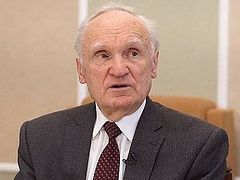We Orthodox Christians usually view business as something explicitly contradictory to the spirit and teaching of the Gospel and regard it as something dishonest. Once we hear this word, the following characters from the Gospel parables immediately come to our mind: a rich farmer who had such terrific crops that he needed larger granaries to store them all; and another rich man at whose gate a poor beggar named Lazarus lay, full of sores. We also remember the words of Christ that It is easier for a camel to go through the eye of a needle, than for a rich man to enter into the Kingdom of God (Mk. 10:25).
Now I am not going to explain that well-to-do people can be very different, that some of them even strive to be righteous and please the Almighty, not to mention the fact that this is a rarity—the more opportunities you have the more temptations you face. Besides, the process of making a fortune is usually a thorny path that sometimes requires immoral decisions and actions. Are there any exceptions to this rule? Indeed there are exceptions. But that’s not what I am going to talk about. This issue will be different.
Here it is: For the children of this world are in their generation wiser than the children of light (Lk. 16:8). Our Lord Jesus Christ says these words in the Parable of the Unjust Steward. What for? In my view, the Savior wants to tell us that if we are willing to become the children of the Kingdom, then we have something to learn from the children of this age: They have their experience, skills and valuable findings that should in no way be ignored.
First of all, if you are troubled by this very word “business”, nothing prevents us from remembering its literal Russian translation. The word “business” in Russian is “delo”, which can be translated as “activity”, “work”. Yes, it is a trifle, but the phrases “This man is doing business” and “This man is doing an activity (or work)” sound very different in Russian.
Many people go into business, but only some of them do well in it and only a select few reach the top of success in business. If we are speaking not about those who are preoccupied only with destroying and stealing all that was created by others long before them, but of those people who start with nothing and achieve success in business on their own, then we can observe the same regularities and patterns in the rise of these entrepreneurs that are significant for us.
You cannot attain a success in any activity without industry, thoroughness, consistency and courage. He who labors only as long as it gives him pleasure, but gives up his undertaking once he gets bored, will never attain his objectives. Neither will he who easily switches from one activity to another. Nor will he who is ready to do anything in order to avoid complications, and faint-heartedly capitulates once they come up.
Business always requires full dedication to your cause, if not self-sacrifice. In many cases a businessman neglects his personal life, health, diet, sleep and almost everything for the sake of good results.
In addition, business requires the ability to discriminate between the things that are of primary and those of minor importance in order to sacrifice the latter and to devote all your energies to the former.
A man of business must necessarily learn to set his goals and devise a plan to accomplish them – and it is requisite for him to do it correctly. Self-discipline and attentiveness are absolutely essential here, for once you allow any distraction or relaxation, all will directly go wrong.
The business world is imbued with the spirit of competitiveness—it is a dog-eat-dog environment. That is bad. But what really matters is that if you stop learning and improving your skills, it means you have brought your own progress and development to a halt, and soon you will surely be replaced by those people who are not lazy and don’t spare themselves.
Business teaches people to be realists. You could argue whether one or another offer, idea, principle or trend is good or not, yet there is only one criterion to distinguish the truth from falsehood: Whether it works or not.
However, at the same time, you cannot do without idealism (to at least some degree), for if you don’t set yourself a task that initially seems (either to you or to somebody else) practically impossible to complete, then there are no prospects for development —you underestimate your own abilities and will probably never achieve anything really impressive.
Business always means a search and creative work—all that is stereotype and lacking originality quickly becomes out-of-date, “a back number”, and uninteresting in modern days. In some sense, business even resembles art, in that each of its spheres, sectors and tendencies has its own virtuosi and masters.
Business requires patience. Hurriedness, the desire to get everything at once, has ruined many businessmen literally at the very start or soon after it. Business requires modesty. By wholeheartedly yielding to the spirit of vainglory you inevitably turn many people against yourself and immediately make enemies. And business requires humility. As long as you think that you have achieved nothing, you still have the ability to exert yourself, make tremendous efforts, and move forward unceasingly.
In case of failure you can find many justifications and excuses: your rivals’ craftiness, unforeseen circumstances, a weak team, a lack of circulating assets, a crisis, computation errors, dishonest partners and so forth… But what is the point of all of this? You have lost. As the saying goes (in this cruel and, in some sense, even “inhuman” world): you are a loser. Have you admitted, acknowledged this? Well… All who have not become “losers” will tell you (without mercy, but honestly) in one voice: neither the team, nor the partners, nor the rivals, nor the crisis are to blame for that; it is only your own fault, whereas all other things are just the factors that you neglected.
True, indisputably business and Christian ascetic labor are different things. The former can be inspired by greed for profit, egotism, and self-love, while the latter must necessarily be free of all this. The former is capable of ruining our souls and making us forget higher things, setting our minds on the things that are on earth. This is possible both in the case of a success and in the case of complete fiasco. In contrast, the latter aims to separate us from this-worldly things and help us to turn to the heavenly ones.
But the trouble is that today ascetics are very scarce, and perhaps that’s why only few have a proper understanding of Christian asceticism. Meanwhile, there are more than enough (to varying degrees) successful and prosperous businessmen. Why so? After all, these people labor for a temporary reward, whereas we together with our brothers and sisters in Christ are called to labor for the eternal reward… In my opinion, the reason can be found in the words of Christ cited above: For the children of this world are in their generation wiser than the children of light. There is no doubt that they are much wiser than we are. If that’s the case… In that case we should most carefully examine their experience and learn from them, lest it should be found at the Last Judgment that they labored and sweated blood for vain and earthly things, while we never “lifted a finger” for the sake of the most precious, heavenly things. If it really proves to be true, then we—even though we may have been poor or penniless—won’t be able to go through the eye of a needle.




